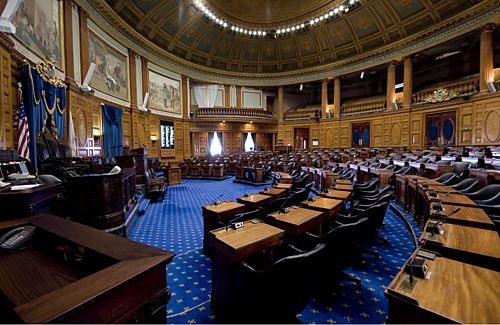 Massachusetts looks likely to raise the age of criminal jurisdiction to 18 next year, and may make more changes as nearly simultaneous new rules from the federal government, a U.S. Supreme Court decision and a report from the state’s Child Advocate nudge Boston lawmakers toward more reforms.
Massachusetts looks likely to raise the age of criminal jurisdiction to 18 next year, and may make more changes as nearly simultaneous new rules from the federal government, a U.S. Supreme Court decision and a report from the state’s Child Advocate nudge Boston lawmakers toward more reforms.
“I think there’s a lot of support” to raise the age, said state Rep. Kay Khan (D-Newton), chair of the Joint Committee on Children, Families and Persons with Disabilities, as well as House sponsor of an age-raising bill that passed House and Senate committees this year.
Right now, Massachusetts reserves juvenile proceedings for those under 17. Khan’s House Bill 450 simply replaced the word “seventeen” with “eighteen.”
“I’ll be working on that pretty steadily and heavily. It just doesn’t make any sense not to do that,” said Khan.
That work comes as the U.S. Supreme Court and judges in state courts are more often echoing advocates for more flexibility in youth sentencing, on an argument that youths are still developing mentally and more capable of reformation than adults.
Lael Chester, executive director of Citizens for Juvenile Justice, a Boston nonprofit, supports raising the age, pointing out to start with that it is inconsistent. “Seventeen-year-old kids are considered adults for criminal purposes and basically nothing else. They can’t sign a contract, can’t vote, can’t serve on a jury,” she said.
“You throw PREA in the mix and it’s going to be interesting,” she commented, referring to the new federal Prison Rape Elimination Act regulations. Those regulations require under-18s to be detained separately from adults without resorting to separate isolation in grown-up lockups.
“One of the easiest ways for us to fix it is just to include 17-year-olds in our juvenile justice system,” argued Chester.
Raising the age is one of the recommendations that came out of Massachusetts state Child Advocate Gail Garinger’s annual report, published earlier this month.
Garinger also recommended a statute to limit the indefinite detention of youths found incompetent to stand trial, writing that it “is needed to satisfy constitutional due process requirements.”
Additionally, the report recommends different oversight of whether and when a child in state custody should take psychotropic medications, such as antidepressants. Right now, judges decide on a child’s treatment plan. Writes Garinger, “this practice has been in place for almost 25 years and has not been evaluated to determine its efficacy.”
Khan said next year, she thinks she will resubmit her House Bill 1421, part of which directs the Department of Youth Services and the Department of Public Health to better identify and meet mental health needs of youth in custody.
“I feel it’s very important, I don’t think we’re really addressing mental health issues of juveniles who come into the system, who come into the courts. I think there’s more that we could be doing,” Khan explained.
Grainger made one more key juvenile justice point: Massachusetts must also change a law that mandates life without the chance of parole for people as young as 14 who commit murder I. Earlier this year, the U.S. Supreme Court declared such mandatory, one-size-fits-all sentences unconstitutional. About half of the states, such as Massachusetts, need to set some other minimum sentence.
“I think there needs to be (sentencing) discretion at both ends,” said Chester, both at a youth’s first sentencing hearing, and at a review after serving some time.
She’s not the only one uncomfortable with juvenile life without parole. At the high-profile 2010 murder trial of John Odgren, a young man who had mental health issues and was 16 at the time he murdered James Alenson, Middlesex Superior Court Judge S. Jane Haggerty handed down the only sentence she could: life without a chance of parole.
But the judge also said, “I have some concern with the statute that mandates that the defendant and other juveniles 14 or older be sentenced as adults for first-degree murder.”
She said Odgren’s guilty verdict was just, but the sentence had tragedy in it.
There are about 60 Massachusetts individuals serving time like Odgren, for murders committed when they weren’t yet 18 years old.
The Massachusetts state legislature begins its next formal session in January.
